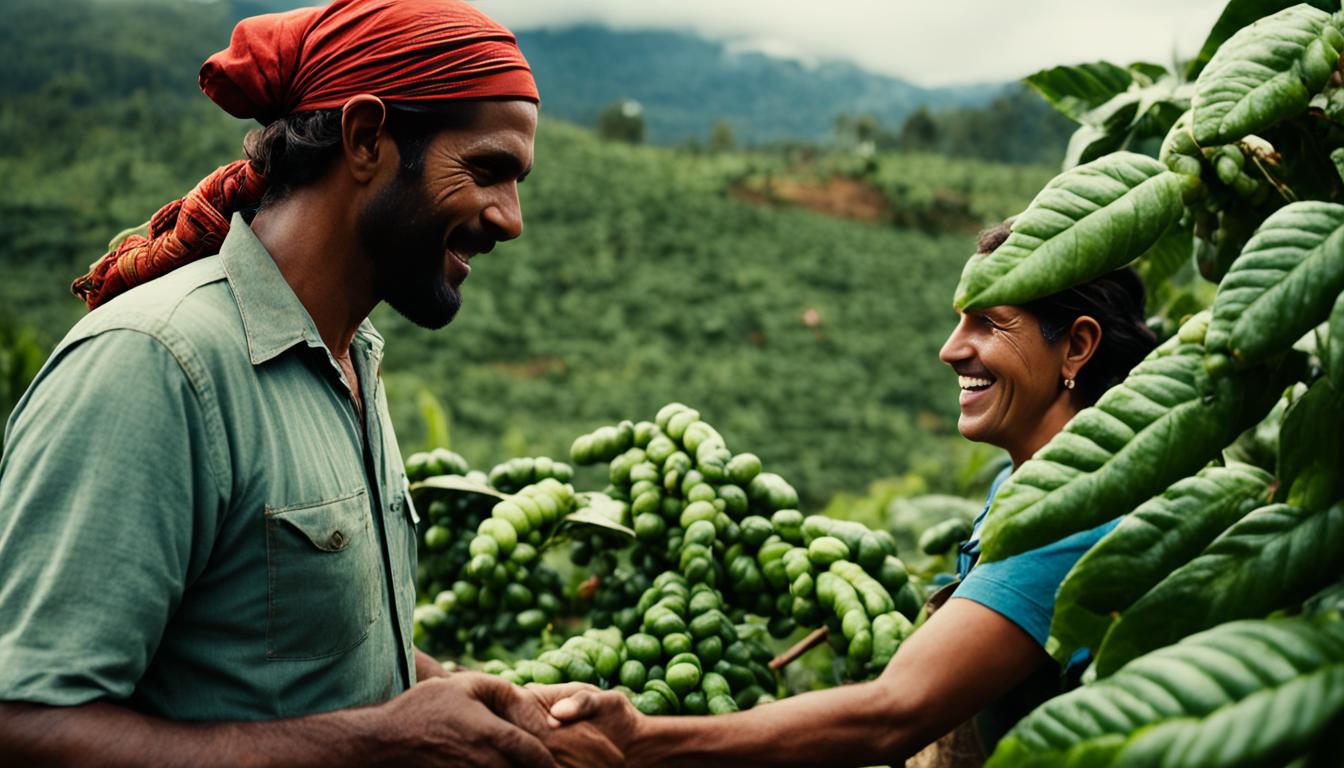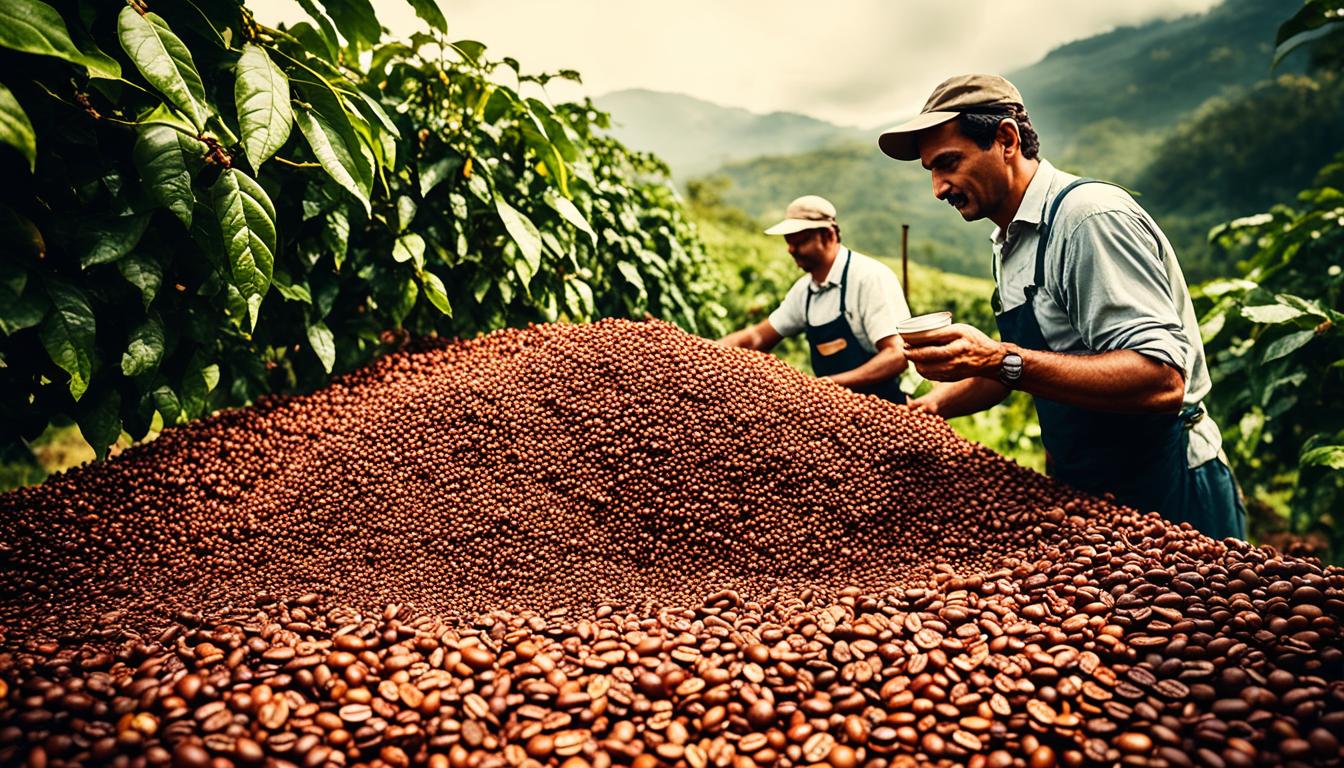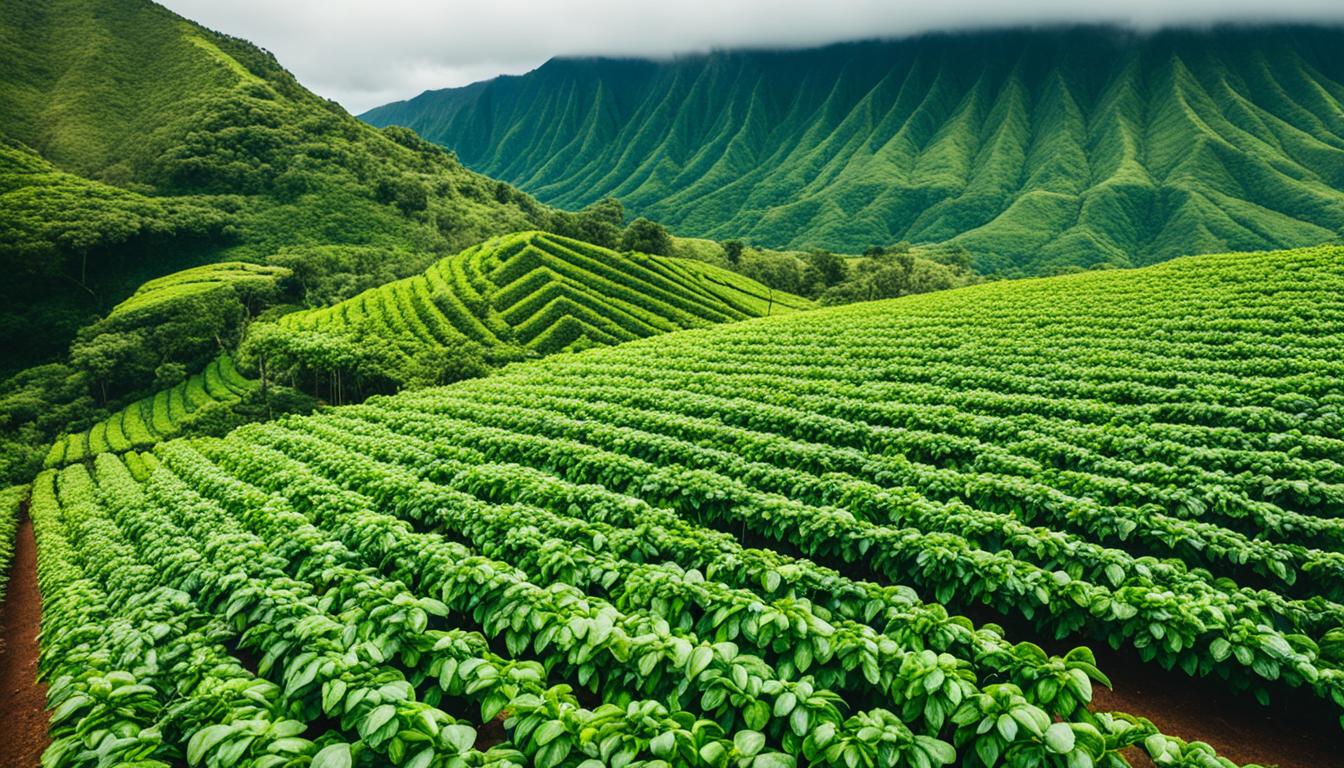Welcome to our article on Direct Trade Coffee and its impact on global trade. In the specialty coffee industry, sustainable coffee sourcing and ethical production are crucial considerations for both coffee farmers and consumers. Direct trade has emerged as a fair trade alternative that promotes transparency, fair pricing, and small-scale farmers’ empowerment. Let’s delve into the world of direct trade coffee and explore its benefits for the coffee industry and the global economy.
Direct trade coffee is a model that establishes direct relationships between coffee growers and roasters, bypassing middlemen and fostering a transparent coffee supply chain. Roasters who practice direct trade focus on building personal relationships with small-scale farmers, paying premium prices for their exceptional coffee. This approach ensures that farmers receive fair compensation for their hard work and exceptional products, while also enabling them to invest in sustainable farming practices and improve their livelihoods.
Unlike the fair trade model, which operates with standard certification and regulations, direct trade emphasizes quality control, high standards, and personal connections. By promoting direct relationships, direct trade enables farmers to collaborate closely with coffee buyers, fostering trust and empowering local communities. Through direct trade, coffee farmers have a unique opportunity to showcase their expertise, produce exceptional coffee, and access niche markets within the specialty coffee industry.
By choosing direct trade coffee, consumers not only enjoy a high-quality and flavorful cup of coffee but also contribute to a more sustainable and ethical coffee industry. The benefits of direct trade extend beyond fair pricing and quality control – they also create lasting impacts on the lives of coffee farmers and their communities. With transparent supply chains, direct trade empowers consumers to make informed choices, support sustainable practices, and promote social and economic justice in the world of coffee.
Key Takeaways:
- Direct trade coffee creates direct relationships between coffee growers and roasters, bypassing middlemen and fostering transparency.
- This model promotes fair pricing, high-quality control, and sustainable farming practices.
- Direct trade empowers small-scale farmers by providing them with fair compensation for their exceptional coffee.
- Consumers who choose direct trade coffee contribute to a more sustainable and ethical coffee industry.
- Direct trade fosters trust, collaboration, and community development within the specialty coffee sector.
The Importance of Direct Trade Coffee
Direct trade coffee plays a crucial role in the specialty coffee industry, bringing about positive changes in sustainable coffee sourcing and ethical production. By establishing direct relationships between coffee farmers and roasters, this model ensures fair compensation for farmers and empowers them to improve their livelihoods. Through direct trade, farmers receive higher prices for their coffee, guaranteeing a more sustainable income that allows them to reinvest in their farms and local communities.
One of the key benefits of direct trade is its emphasis on sustainable farming practices. Roasters who engage in direct trade often work closely with farmers to promote environmentally friendly cultivation methods. By prioritizing sustainability, direct trade helps to protect ecosystems and preserve natural resources for future generations.
Beyond sustainable sourcing, direct trade also encourages better quality control from roasters. With direct relationships established, roasters have greater control over the entire coffee production process, from seed to cup. This allows them to ensure the highest quality standards, resulting in exceptional specialty coffees that are enjoyed by consumers around the world.
Direct trade enables transparency in the coffee supply chain, providing consumers with the assurance that their coffee is ethically sourced and produced. It promotes positive impacts on local communities by fostering economic growth and empowering farmers to improve their living conditions. By choosing direct trade coffee, consumers can actively support a more transparent and ethical coffee industry.
Image:
Understanding Fair Trade and Direct Trade
In the world of coffee sourcing, there are two prominent models that shape the industry: fair trade and direct trade. While they share the common goal of promoting ethical practices and improving the lives of coffee farmers, fair trade and direct trade differ in their approaches and focus.
Fair Trade: Empowering Farmers Worldwide
Fair trade certification is an internationally recognized system that aims to uplift all types of farmers worldwide by adhering to comprehensive standards. These standards encompass fair wages, environmental sustainability, and ethical business practices. Fair trade ensures that farmers receive a minimum price for their coffee, providing them with stability and economic security in an ever-fluctuating market.
“Fair trade certification guarantees a safety net for coffee farmers, offering them a minimum price for their harvest.”
Additionally, fair trade initiatives focus on community development, providing resources for education, healthcare, and infrastructure. By fostering these social and economic improvements, fair trade uplifts farming communities and helps break the cycle of poverty.
Direct Trade: Fostering Relationships and Quality
Direct trade, on the other hand, takes a more personalized approach to coffee sourcing. It emphasizes building direct relationships between farmers and buyers, prioritizing transparency and quality. In this model, coffee roasters establish direct connections with farmers, bypassing middlemen and creating a more streamlined supply chain.
“Direct trade facilitates direct relationships between growers and roasters, enabling transparency and quality control throughout the coffee production process.”
By cutting out intermediaries, direct trade ensures that farmers receive a fair price for their exceptional coffee. This model also enables farmers to invest in sustainable farming practices, promoting environmental stewardship. Direct trade fosters a close partnership between growers and roasters, encouraging cultural exchange and collaboration.
Fair Trade vs. Direct Trade: Different Approaches, Common Goals
While fair trade and direct trade operate under different frameworks, both models contribute to improving the coffee industry and the livelihoods of farmers. Fair trade places emphasis on global standards, ensuring fair compensation and community development, while direct trade focuses on quality and direct relationships, creating a more transparent supply chain.
Here’s a comparison of fair trade and direct trade:
| Fair Trade | Direct Trade |
|---|---|
| Regulated standards | Direct relationships |
| Minimum prices | Exceptional quality premiums |
| Community development focus | Cultural exchange focus |
| Environmental sustainability | Sustainable farming practices |
Both fair trade and direct trade serve as ethical alternatives to conventional coffee sourcing methods. The choice between the two depends on personal preferences and priorities. Regardless of the approach, supporting direct trade or fair trade coffee ensures that farmers receive fair compensation and promotes sustainable coffee production.
Benefits and Challenges of Direct Trade and Fair Trade
Both direct trade and fair trade have their own unique advantages and obstacles. Direct trade empowers coffee farmers by ensuring fair compensation, promoting quality control, and encouraging sustainable practices.
Direct trade establishes long-term relationships between farmers and buyers, fostering transparency and cultural exchange. This direct connection allows for better quality control and a more equitable distribution of profits throughout the supply chain.
On the other hand, fair trade focuses on broader social and environmental goals, with a specific emphasis on poverty alleviation, community development, and environmental stewardship.
Fair trade provides a safety net for marginalized producers by setting minimum prices and offering support programs in areas such as education and healthcare.
Despite its benefits, direct trade does have some challenges. One of the main criticisms is the lack of standardization and accountability. Unlike fair trade, which has rigorous certification processes, direct trade operates on a case-by-case basis and relies heavily on the integrity and ethics of the parties involved.
This lack of standardization makes it harder for consumers to verify the claims made by direct trade companies and can lead to potential inconsistencies in terms of wages and working conditions for farmers.
Fair trade, on the other hand, faces challenges in incorporating coffee quality into its certification process. While fair trade ensures a minimum price for coffee, it does not have a direct mechanism for rewarding outstanding quality.
This limitation can make it difficult for coffee farmers to differentiate their exceptional products in the market and receive higher premiums for their efforts.
Despite these challenges, both direct trade and fair trade make significant contributions to coffee sustainability and offer consumers the opportunity to make ethical choices. The choice between direct trade and fair trade ultimately depends on individual preferences and priorities.
By supporting either direct trade or fair trade coffee, we can directly impact the lives of coffee farmers and contribute to a more sustainable and ethical coffee industry.
Summary:
Direct trade benefits:
- Fair compensation for farmers
- Quality control
- Sustainable practices
- Transparency and cultural exchange
- Long-term relationships
Fair trade benefits:
- Poverty alleviation
- Community development
- Environmental stewardship
- Minimum prices for marginalized producers
Challenges of direct trade:
- Lack of standardization and accountability
- Verification and consistency issues
Challenges of fair trade:
- Difficulty incorporating coffee quality into certification
- Potential limitations in rewarding exceptional products
Both direct trade and fair trade contribute to coffee sustainability and offer consumers the choice to support a more ethical and transparent coffee industry.

Conclusion
Direct trade coffee has emerged as a powerful alternative to conventional coffee sourcing models. With a focus on transparency, fair pricing, and sustainable practices, direct trade benefits both farmers and consumers. By establishing direct relationships and supporting small-scale farmers, direct trade ensures that the specialty coffee industry thrives and continues to deliver exceptional coffee.
However, it is important to acknowledge the important role that fair trade plays in promoting coffee sustainability. Fair trade certification guarantees fair wages, promotes community development, and safeguards environmental stewardship. Both direct trade and fair trade contribute to the larger goal of creating a more ethical and sustainable coffee industry.
As consumers, we have the power to support direct trade and fair trade coffee by making conscious choices. By seeking out direct trade and fair trade certified coffees, we can contribute to positive change and empower coffee farmers around the world. Our choices matter, and together, we can shape the future of sustainable coffee sourcing and ensure a thriving specialty coffee industry.
FAQ
What is direct trade coffee?
Direct trade coffee is a model of coffee sourcing that establishes direct relationships between growers and roasters, promoting transparency, fair pricing, and high-quality control.
How does direct trade benefit coffee farmers?
Direct trade ensures that farmers receive higher prices for their coffee, leading to a more sustainable income. It also encourages sustainable farming practices and allows for better quality control.
How does direct trade benefit consumers?
Direct trade creates a more transparent and ethical coffee supply chain, allowing consumers to make informed choices and support ethical practices. It also promotes positive impacts on local communities.
How does direct trade differ from fair trade?
While fair trade focuses on improving the lives of all types of farmers worldwide, direct trade emphasizes direct relationships, transparency, and high-quality coffee. Direct trade rewards farmers for exceptional quality, while fair trade guarantees a minimum price and supports community development.
What are the benefits of direct trade and fair trade?
Direct trade ensures fair compensation for farmers, quality control, and sustainable practices. Fair trade focuses on poverty alleviation, community development, and environmental stewardship. Both models contribute to coffee sustainability in different ways and offer consumers the opportunity to make ethical choices.
What are the challenges of direct trade and fair trade?
Direct trade lacks standardization and accountability, while fair trade faces challenges in incorporating coffee quality into its certification process.




